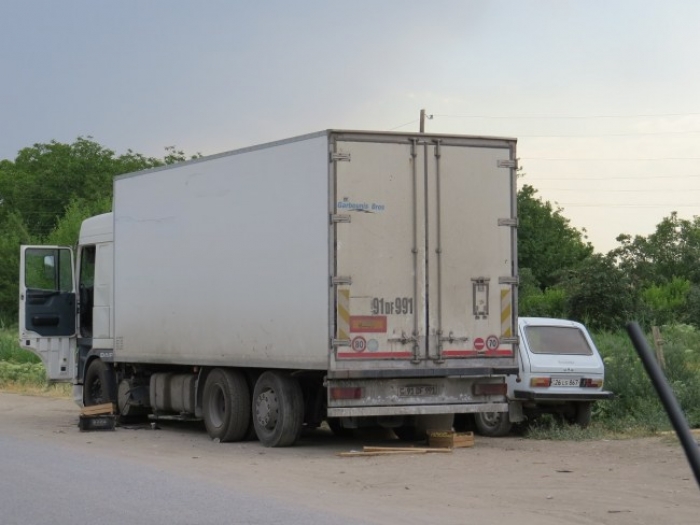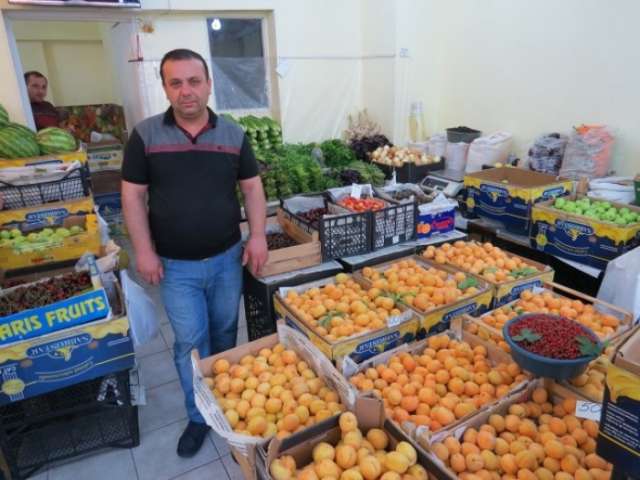Khachatur Abrahamyan lives in the village of Aralez in the Ararat region of Armenia. He regularly takes a dozen boxes of apricots, which he has grown himself, to one fruit and vegetable shop in Yerevan. Each time he hastily unloads them from the car. The roadside of the shop is dotted with red lines, indicating a paid parking spot. He has only 15 minutes to unload the apricots and leave, otherwise, he faces a fine of ֏5,000 ($10).
Abrahamyan does not want to pay ֏150 ($0.3) for an hour of parking — it is a matter of a principle for him.
‘The streets belong to us as much as to “them”. Why should I pay for parking even when it is not clear to whom I am paying?’, says Khachatur, involuntarily swinging his arms.

The red lines are just the tip of the iceberg of his discontent, apparently accumulated over the month since the beginning of the season. Unlike in previous years, this harvest of apricots has been extremely bountiful. However, the villagers are not satisfied. At the beginning of July, the wholesale prices for apricots ranged from ֏100–200 ($0.2–0.4) per kilogramme. Last season, the price per kilogramme was from ֏300–1,000 ($0.6–2). Khachatur’s income for the whole year comes from the sale of apricots in June–July.
‘The government is the main culprit for the current situation. They do not control Spayka and other buyers of apricots. [The companies] adjust the prices as they see fit, while we make a loss’, he says resentfully.
Abrahamyan unloads the boxes and takes his money. Despite his indignation for the situation, he starts smiling. He accumulated debts over the winter and can now repay them. Annual preferential interest rates for state-supported agricultural loans reach 24%. Abrahamyan hopes that the apricots will allow him to pay off all his creditors. He, like many of his fellow villagers, hoped that the plentiful harvest would allow them not only to pay off their loans, but to get by until next season.
‘Now it is clear that this will not happen. God only knows what we will do now. Probably, we will again have to go to Russia to work’, says Khachatur, leaving the shop.
Spayka’s apricot monopoly
Spayka is an Armenian export firm which has a monopoly on exports of Armenian apricots. It is not known for certain who the real owners of the enterprise are, however the media often link Spayka with the name Mikayel Minasyan, Armenian Ambassador to the Vatican and son-in-law of the president.
The company’s transport fleet exceeds 200 lorries. They export and sell fruits and vegetables to Russia, other former Soviet republics, and to Europe. Spayka’s investments in agricultural production are expected to reach $68 million in 2017; last year, this was $86 million.

The company has two main bases in Russia: in Krasnodar and Moscow. Other Russian regions receive Armenian products from these two points under the Ararat Fruit brand. In 2016, Armenia produced 85,000 tonnes of apricots, more than 25,000 of which was exported to Russia.
In June, the Armenian government transferred 160 hectares of land to Spayka on the outskirts of Yerevan. The company plans to build new bases and complexes on this land.
Forcing out competition to spiralling prices
A scandal recently broke out after a number of small Armenian exporters to Russia began to appeal to Lena Nazaryan and Arayik Harutyunyan, two MPs from the opposition Yelk (Way Out) block. They claim that Spayka has blocked access to the largest wholesale markets in Krasnodar, ‘Roza Vetrov’ (Rose of the Winds) and ‘Khutor Lenina’ (Lenin’s Farm), to other apricot exporters from Armenia.
These markets now accept produce only from Spayka. Lorry drivers who work in Krasnodar were advised to look for other markets outside the region. This forced small exporters to suspend purchasing of apricots. Spayka did the same — for a couple of days. As a result, in the second half of June — right in the high season — the price for choice apricots from rural residents of the Ararat and Armavir regions decreased from ֏600 to ֏400 ($1.2 to $0.8) per kilogramme. Naturally, the prices for fruit on the market started to fall precipitously.
Apricots are particularly perishable fruits, their season lasts no more than a month and a half. The temporary suspension in exports led to a glut on the local market and a drop in prices to ֏100–200 ($0.2–$0.4).

Spayka’s unofficial spokesperson MP
Spayka gave no official reaction to the issue, however, Samvel Farmanyan, an MP from the ruling Republican Party closely connected to the company and directly with Mikayel Minasyan, wrote a post on his Facebook page with the note ‘for media attention’, where he presented his conversation with a representative of the company’s management.
He said that he knew nothing about the problem of small exporters and that the company buys all available apricots from villagers. He also claimed that in Russia, Spayka must compete fiercely with exporters from Azerbaijan and Turkey, and all who do not believe this can go see for themselves.
However, rural people from apricot growing regions did not appreciate these comments, and residents of the village of Jrashen, Ararat region, blocked an important highway at the end of June, in protest against Spayka violating agreed prices. The company offered ֏400 ($0.8) per kilogramme instead of the previously agreed ֏600–800 ($1.2–$1.6). Representatives of the ministry went to Jrashen and soon announced that that they had ‘fixed the problem’.
However, villagers noted that the conflict was resolved solely at their expense — they had to agree to sell apricots at the proposed price.
The Ministry of Agriculture’s explanation
The Ministry of Agriculture disputes the villagers’ position and accusations against Spayka. Deputy Minister Robert Makaryan attributes their ‘aggressive attitude’ with the late ripening of apricots putting Armenian growers behind others. He noted that in Daghestan and Uzbekistan, for example, fruits ripened much earlier, which led to the price dropping on the Russian market.
Referring to the head of Armenia’s trade mission in Russia, Karen Asoyan, the deputy minister, said that Krasnodar itself initiated the closure of the market for small exporters. Minister for Agriculture Ignati Arakelyan told reporters on 10 July that private companies do not create obstacles for small exporters, the problem lies in the fact that large countries often seek to work with large suppliers, in this case with Spayka.
Apricots in the dump
The owner of a large fruit and vegetable shop in Yerevan, Gnel Hayrapetyan, says that the weak purchasing power of Yerevan’s residents is also to blame for the low prices.
‘There are not so many wealthy working people today. Additionally, now is the holiday season, the city is empty, so trade has fallen. We are forced to keep these prices, because at the end of the day we have to throw most of the produce in the dumps. Therefore, we do not sell apricots for cheaper than ֏500 ($1) per kilogramme. There is nothing to be done. It is necessary to survive somehow’, says Hayrapetyan.

He adds that there are various reasons the prices fall. According to him, one is the bountiful harvest of apricots this year, not only in Armenia, but in Russia and Uzbekistan as well. Another, he says, lies in the aspiration of some companies to create a monopoly and to force competitors from the market, through the alternation of dumping and artificial understatement of prices.
Both factors hit hard the pockets of rural residents, who are in a desperate situation and cannot even repay their loans. Hayrapetyan says that he often buys apricots knowing that he will not be able to make a profit on them, because he has many old friends asking him for support.
















































